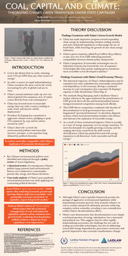Research Reflection 2: End of the Research Period!
This week marks the end of my six-week research period at Laidlaw. After concluding my final meetings here at Barnard and packing my belongings to head home, I have had some time to reflect on my research and I'd like to present a couple of my major takeaways:
Always be skeptical.
After six weeks of researching the history and politics of China, a country that is well known for its extensive use of censorship and propaganda, I have learned not to trust everything I read. During the first half of my research, I compiled a database of all of China's environmental policies. At first, I found myself quite surprised and impressed by how ambitious China's policies were—promises of carbon peaking at 2030 and carbon neutrality by 2060, fueled by an abrupt shift to renewable energy and "green" living. However, as I began researching further into the implementation and efficacy of these policies, I quickly learned that these "green" laws had no impact on the local scale or were cover-ups for further production of "dirty" energy. Furthermore, corruption and cheating makes it even more difficult to enforce any punishment against polluters. Many Chinese companies stuff cotton in emissions monitors to get cleaner readings and even send trucks with "mist cannons" to spray water vapor around air quality monitoring systems to fool the sensors. Even in official government reports, US researchers like David Sandalow have found significant inconstancies in the Chinese data. This has taught me to be skeptical and to double and triple check even the seemingly credible sources.
Policies are irrelevant if they don't work on the local scale.
From a high-level policy analysis standpoint, China is at the forefront of environmental protection and climate change mitigation. They issue sweeping "action plans" mandating the closure of coal plants and vow to reduce emissions, but on the local level, it just doesn't get done. This is due to both the inefficient nature of China's government structure, its top-down policy implementation methods, as well as the conflicts of interest between China's government officials and state-owned-enterprises. Because of this, I now realize the importance of examining the implementation of policy on a local scale, and have shifted my own research to include local-level information.
The Trump administration poses a real and dangerous threat to China's efforts in combating climate change.
On a more relevant note, in the last six months many of the actions that the Trump administration has taken could drastically alter China's willingness to continue their decarbonization efforts. US-China trade wars and the wars in Ukraine and Iran have disrupted global trade and increased anxieties around energy security. Historically, during periods of economic stress (or even just slight instability), China has fallen back on their coal reserves and rolled back their environmental protections in order to guarantee continuous energy production. Due to these recent conflicts, it looks like China may fall back into that pattern yet again this year. Furthermore, Trump's Big Beautiful Bill will slash most incentives to promote renewable energy established by Biden's Inflation Reduction Act, likely resulting in a loss of demand for solar panels and other products that are mainly produced by China. Experts have predicted that this could potentially cause a ripple effect into other economies, signaling to China (and other nations) to slow down production of renewables and shift back to "dirty" energy.


Please sign in
If you are a registered user on Laidlaw Scholars Network, please sign in